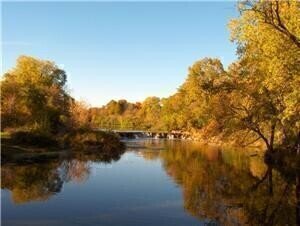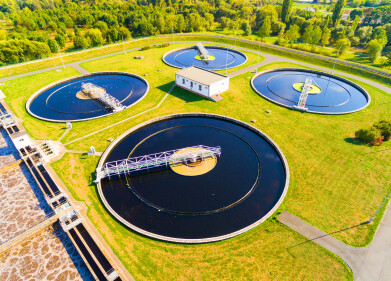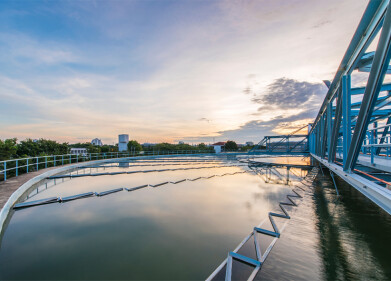Water/Wastewater
Final Year for River Wye, says Campaigner
May 04 2022
In 2007, something momentous happened – but you’ve probably never heard about it. Probably because this iconic event unfolded over a couple of pages in an obscure journal for Australasian psychiatrists.
A collaboration between philosopher Glenn Albrecht and a group of leading psychiatrists, this study considered the emotional lives of two communities inhabiting gravely disrupted ecosystems in New South Wales, one impacted by long-term drought and the other massive open-cut mining operations. With shocking regularity, Albrecht and his team observed an intense distress that seemed to be caused by the drastic, largely irreversible changes in their immediate environments. On further inspection, this distress revealed itself to be a peculiar type of nostalgia, one brought on not by leaving but by staying put.
This ‘homesickness you have when you are still at home’ is induced in people powerless to stop the radical transformation of their surroundings, thus succumbing to an often-debilitating nostalgia for a home that is in the process of disintegrating around them. As the authors worriedly explain, these presentations appear to be symptoms of a newly-discovered psychological malady, a form of suffering unique to our era of large-scale climate change: solastalgia.
Now, Albrecht et al.’s monumental paper may have focussed on the inhabitants of New South Wales, but if it were published in 2022, it might just as successfully investigate the inner lives of people living along the dangerously polluted River Wye.
In fact, they could just interview Angela Jones.
Wild Woman of the Wye
When it comes to British waterways, the Wye has very few equals. For starters, it’s the UK’s fourth longest river, winding through south-eastern Wales for over 150 miles before flowing into the Bristol Channel. The gold, silver and bronze medals go to rivers which have nothing much else going for them. The Wye, by contrast, has a litany of official designations and protection orders that speak to the river’s specialness. The lower part of the Wye Valley, for instance, is designated an Area of Outstanding Natural Beauty, and the river as a whole boasts two separate Sites of Scientific Interest, which order the preservation of ecosystems deemed unique on account of their flora and fauna. Most importantly, the Wye is a Special Area of Conservation, acting as a critical wildlife corridor for a range of nationally- and internationally-monitored species.
It’s no surprise, then, that it’s been a favoured tourist destination since the ‘40s. With natural rapids at Symonds Yat, free access for kayaking across a range of skill-levels, some of the best wild swimming in the country and the frequently jaw-dropping Wye Valley Walk, visitors to the Wye are spoilt for choice. For families up and down the UK, this river has furnished generations with happy memories and somewhere to retreat from their unrelenting daily lives.
Angela Jones couldn’t agree more. For 35 years, the river has been a sort of haven for Jones; she's spent around eight hours a day in the water, instructing thousands of pupils in wild swimming, and often slept along its banks. At 55, ‘the Wild Woman of the Wye’, as she’s known, has spent the majority of her life either in or around the river – it's in her blood. And she cares for it with a striking tenderness, making it part of her routine, for instance, to monitor phosphate levels across the length of the Wye.
But this closeness has brought mostly sadness. Over the year, Jones has watched as the Wye became more and more polluted, growing more and more distressed by the prospect of the loss. Nothing whatsoever was being done to save this river that had been such a fundamental part of her life for so long.
“I could see the river dying, so I asked myself ‘how do I feel'?” Angela Jones told Hush. "I felt bereaved.”
Cambrian Solastalgic
Over the last decade, there has been significant decline in fish species in the Wye, particularly river crowfoot and salmon. Regarding the latter, for instance, a report from the Wye and Usk Foundation contends that 2021 was ‘the worst season on record’ for salmon catches in the Wye. Concurrently, the river has shown a sharp increase in algae, a colonisation that has depleted the oxygen content of the water, choking out other plants and animals (like our disappearing salmon).
It’s likely that this disruptive algae is being sustained by excessive phosphate levels. Over five years of monitoring, for instance, Angela Jones very rarely logged a reading in the proper range, which, although varying across the river, is capped at 0.5 ppm.
According to modelling by the Environment Agency, the two principal sources of pollution in the Wye are agriculture – in particular, intensive poultry farming – which accounts for 64% and sewage overflows, accounting for 28%. In both cases, a substantial number of phosphates will find their way into the Wye, whether they’re in excrement or phosphorous-based fertiliser.
Indeed, like many other Welsh rivers, the Wye has a sewage problem. In 2020, Welsh Water, the non-for-profit corporation which owns many of the nation’s water treatment works, registered 100,000 sewage overflows across 2,000 sites, with discharges lasting 900,000 hours in total. In the past, the non-profit has been fined hundreds of thousands of pounds for indirectly killing fish and for spilling unwarranted chemicals into public waterways.
Currently, all of these factors compound to threaten the stability of the Wye as an ecosystem and as the years go by, the margin for recovery gets slimmer. Regarding the scale of the challenge, Professor Steve Ormerod of Cardiff University told the BBC: ‘We’re looking at years to decades to address what have become extensive, wide-scale, long-term developing problems.’
Or in Angela Jones’ more impassioned and emphatic words: ‘We’re on a cliff-edge now with the Wye where I really feel that 2022 is our last year to make it change.’
For a technical consideration of one potential solution, follow the link to reveal an article on the use of high-resolution monitoring for the conservation of rivers.
Digital Edition
IET 34.2 March 2024
April 2024
Gas Detection - Biogas batch fermentation system for laboratory use with automatic gas analysis in real time Water/Wastewater - Upcycling sensors for sustainable nature management - Prist...
View all digital editions
Events
Apr 30 2024 Melbourne, Australia
Apr 30 2024 Birmingham, UK
May 03 2024 Seoul, South Korea
May 05 2024 Seville, Spain
May 06 2024 Minneapolis, MN, USA


















